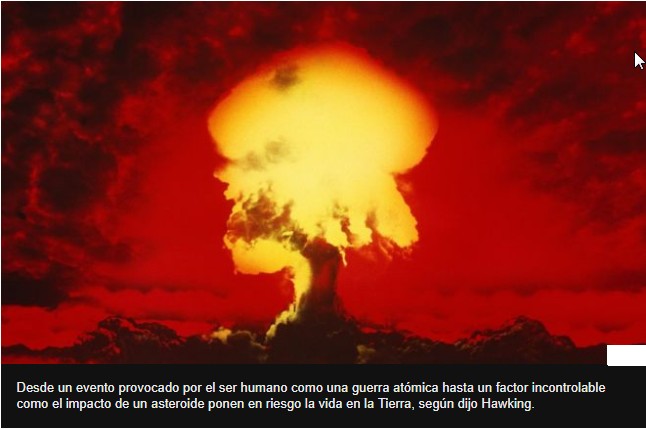
The academic fame of Stephen Hawking, the British physicist who died Wednesday at age 76, is based on his research on black holes and Albert Einstein's theory of general relativity.
But, as a scientific disseminator, he used to leave his research area, using his recognition to highlight what he considered the great challenges and existential threats for humanity in the decades ahead.
1 . Leave the Earth
Hawking was worried that we would place all our hopes on Earth. For decades he asked humanity to begin the process of building permanent settlements on other planets.
"We are running out of space and the only spaces we can go to are other worlds," he said last year at the scientific and artistic festival Starmus, in Norway.
"For the good of humanity": Stephen Hawking asks the world powers to send astronauts to the Moon in this decade
"It's time to explore other solar systems, and expanding can be the only thing that saves us from ourselves, and I am convinced that humans need to leave Earth."
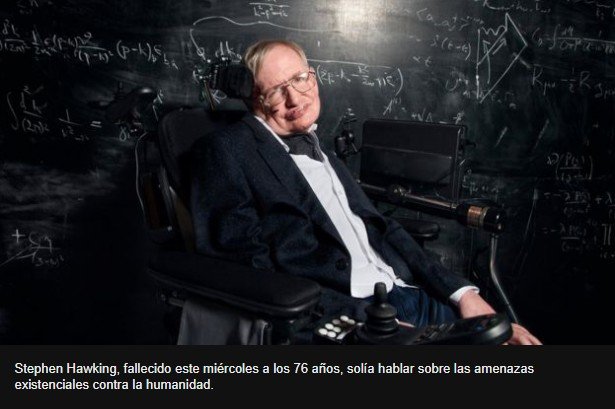
According to Hawking, sooner or later humanity would be the victim of a catastrophe that would push the species to extinction.
What worried him most were the so-called low-probability, high-impact events; for example, the collision of a large asteroid against the planet.
But the British also perceived other potential threats, such as artificial intelligence, climate change, genetically modified viruses and a possible nuclear war, to name a few examples.
In 2016, Hawking told the BBC: "Although the probability that the Earth will suffer a disaster soon is quite low, it accumulates over time and becomes almost a certainty for the next thousand or 10,000 years."
While he was convinced that by then humans would already inhabit other parts of the cosmos, he also said: "We are not going to establish self-sufficient colonies in space for at least the next 100 years, so we must be very careful until so".
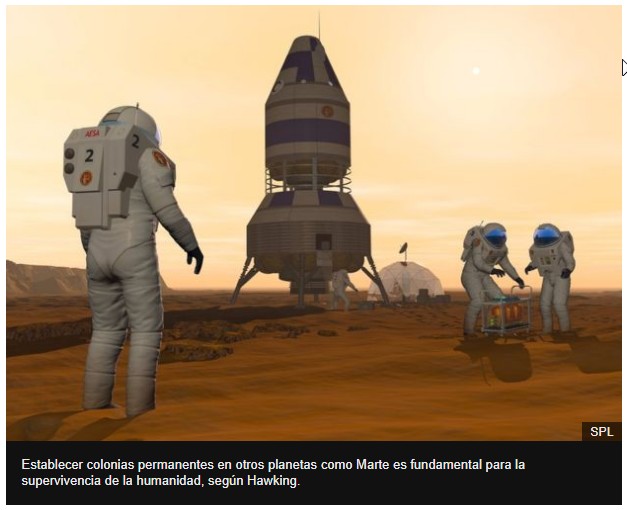
In line with his ideas, in 2016 Hawking provided support for an ambitious research project to develop interstellar exploration technologies called Breakthrough Starshot.
2 . Smart machines
Hawking recognized the great opportunities arising from advances in artificial intelligence, but he also warned of its dangers.
In 2014, he told the BBC that "the development of a complete artificial intelligence could mean the end of the human race."
"Humans, we are beings limited by our slow biological evolution, we can not compete with the machines and we will be overcome by them," he added.
In his opinion, the primitive forms of artificial intelligence developed to date had proved very useful. In fact, the technology he used to communicate incorporated this type of technological development.
But Hawking feared the consequences of those advanced forms of artificial intelligence, which could equal or surpass humans.
At the time, some academics stressed that the comments of the physicist were based on obsolete concepts of science fiction.
One of the most prominent detractors was the engineer and robotics ethicist Alan Winfield, who works at the Robotics Laboratory in Bristol, United Kingdom.
"I find Hawking's statements utterly useless," he told the BBC then. "The problem is not inevitable, Hawking speaks of a very small probability based on a series of events that would have to happen one after the other for that to happen."
3 . Global warming
Hawking believed that global warming was one of the greatest threats to life on the planet.
The physicist particularly feared the arrival of the so-called "turning point", a time when global warming would become irreversible.
In this regard, he made a series of incendiary statements last year after the decision of the United States to withdraw from the Paris climate agreement.
"By denying the evidence of climate change and withdrawing from the Paris agreement, (US President) Donald Trump will cause avoidable environmental damage to our beautiful planet, endangering nature, for us and our children," he claimed.
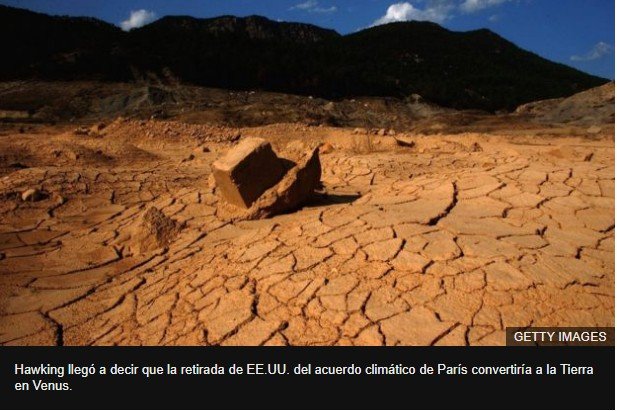
He added: "Trump's actions could cause the Earth to cross that threshold (from the point of inflection) to become Venus, with a temperature of 250ºC and rains of sulfuric acid."
The United Nations Intergovernmental Panel on Climate Change agrees on the potential risk of reaching the climate turning point as temperatures increase, although it also emphasizes the lack of complete information on the subject.
Four . Extraterrestrial contact
There is a whole area of scientific research devoted to monitoring intelligent life signals coming from other parts of the universe.
Hawking was not against this, but warned about the risks of trying to contact alien civilizations actively.
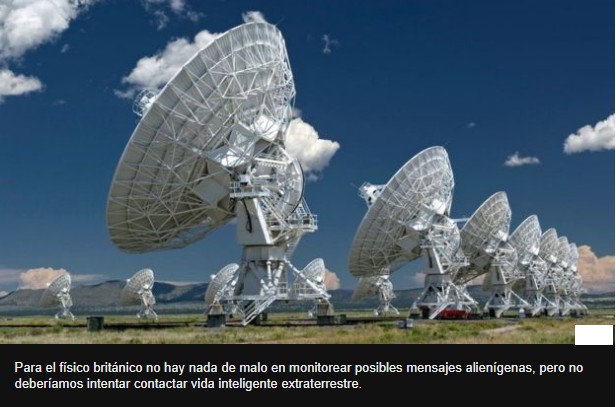
"I think it would be a disaster," he told the National Geographic channel in 2004 about possible contact with aliens.
"The aliens would probably be very far ahead of us (...) I think we should stay downcast," he added.
Then, in 2010 he delved into this concept and told the television channel Discovery that the aliens could attack the Earth to steal our resources: "If the aliens visit us, the result would be much more like when Columbus landed in America," he said.
"Just by looking at ourselves we can see how intelligent life could turn out to be something we would not like to know."
Good Friends If You Like The Information A Positive Vote Please would you be really helping me a lot.